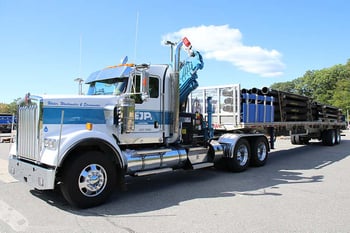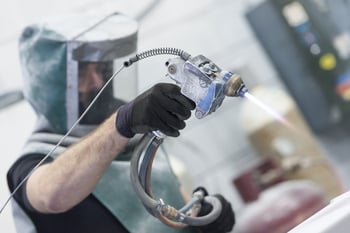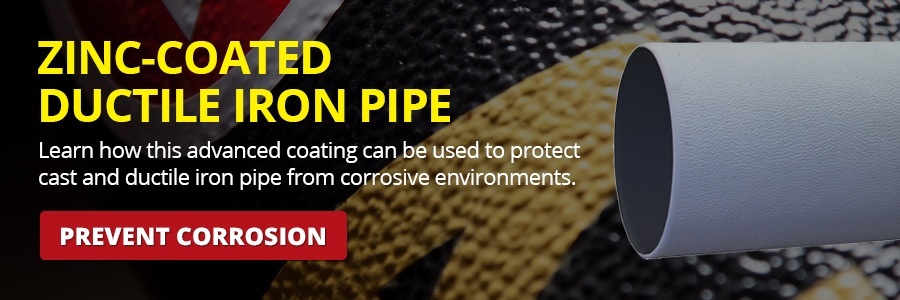How Zinc Makes Tough, Durable Ductile Iron Even Better
- Home
- Team EJP Blog
- How Zinc Makes Tough, Durable Ductile Iron Even Better
- Aug 2, 2016 10:16:27 AM
- Everett J. Prescott
Ductile iron pipe is the industry standard in supply main piping. But sometimes, in some situations, you need a tougher option. Many municipalities facing problematic soil conditions or corrosion issues are starting to turn to zinc-coated ductile iron pipe to ensure a longer-lasting supply main while lowering your overall maintenance and replacement costs. But how does it work and why is it superior to plain ductile iron? Here's the basics.
*Updated 07/23/2020*
 Zinc is a metal that has been used in a wide range of corrosion-control situations. Because it has a more negative electrode potential compared to many metals, it is commonly used to create a coating of zinc on top of more important structural metals, such as ductile iron. When the zinc comes into contact with moisture or corrosive agents, it corrodes, maintaining the integrity of the metal beneath. This happens because zinc is a reactive metal that acts as a cathode while protecting more important metals. Zinc is most commonly used due to its low cost. When coated with a protective film, its ability to protect more costly metals is further enhanced, delivering strong protection for many years to come. But does zinc work well in water utilities?
Zinc is a metal that has been used in a wide range of corrosion-control situations. Because it has a more negative electrode potential compared to many metals, it is commonly used to create a coating of zinc on top of more important structural metals, such as ductile iron. When the zinc comes into contact with moisture or corrosive agents, it corrodes, maintaining the integrity of the metal beneath. This happens because zinc is a reactive metal that acts as a cathode while protecting more important metals. Zinc is most commonly used due to its low cost. When coated with a protective film, its ability to protect more costly metals is further enhanced, delivering strong protection for many years to come. But does zinc work well in water utilities?
Zinc-coated ductile iron supply lines have been in use for over 60 years in international markets, starting in Europe in 1958, but it's typically been for smaller lines, such as those that supply a residence or move water within a facility. It's also been used internationally since the 1980s, with millions of feet of water mains protected by the anti-corrosive power of zinc as the standard increased the impregnation from 130 grams of zinc per square meter to 200 grams in the same area. In 1995, using that level of zinc impregnation beneath a coating of asphalt paint became the standard in Europe. At Team EJP, we're proud to be able to bring this tough material to the domestic market.
Zinc roofing sheathing has been proven to have a life expectancy of 100 years and the projected life expectancy of zinc-coated ductile iron water supply mains is expected to meet that time frame as a minimum. Some locations have had non-coated ductile iron pipe last over 100 years and zinc-coated pipe would be expected to last significantly longer than that minimum in those soil conditions. Because this type of pipe has been tested and used extensively in a wide range of soil types and conditions internationally, you can enjoy the benefits of a perfected product without the risks of investing in a water main pipe that is still untested.
 Zinc coatings are typically applied in a molten state and sprayed onto the base material, in a fashion very similar to most spray coatings. But how does it work? It forms a zinc oxide exterior, which protects the iron beneath it. If the metal is scratched or cut down to the ductile iron, zinc ions will migrate to the area, creating a scar over the iron and protecting it from further damage.
Zinc coatings are typically applied in a molten state and sprayed onto the base material, in a fashion very similar to most spray coatings. But how does it work? It forms a zinc oxide exterior, which protects the iron beneath it. If the metal is scratched or cut down to the ductile iron, zinc ions will migrate to the area, creating a scar over the iron and protecting it from further damage.
Zinc is an anode to iron, which means it is less likely to corrode. It corrodes at a much slower rate than iron and the product of that slow corrosion forms a protective layer on the surface of the pipe, beneath the asphalt film. The asphalt film helps restrict the movement of the zinc in the soil to the surface of the pipe while protecting it to slow down the corrosion process by limiting the amount of surface area exposed to the soil. If the pipe is scratched, even down to the iron, the zinc galvanizes and forms a protective layer of zinc compounds, crystalline in nature, that provides additional protection to the iron.
If you're wondering what the specifics are on these pipes, here's a quick rundown:
- The pipe system meets AWWA standards, including AWWA C104, C110, C111, C150, C151 and C153.
- The zinc is arc-sprayed at a rate of 200g/m2 per ISO 8179 with a minimum mean asphalt coating of 3 mils and a localized minimum of 2 mils.
- It's available in 20' standard lengths as well as trim lengths and specialty sizes to meet project specifications.
- It features push-on joint or push-on restrained joints.
- It has a cement-mortar lining which does not receive a seal coat.
As you can see, zinc-coated ductile iron creates a stronger, more durable water main supply chain. If you still have questions about zinc-coated ductile iron pipe, our experts are standing by to help you get the information you need. At Team EJP, we're dedicated to helping you find the best possible solutions to your waterworks department's problem. Please feel free to contact us today for more information on how we can help your operation succeed.








